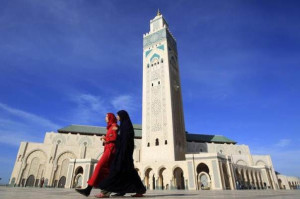Thomson Reuters Foundation
Author: Emma Batha

Moroccan women walk past the Hassan II mosque in Casablanca February 24, 2011. REUTERS/Pascal Rossignol
Every day hundreds of Moroccan women and girls put their lives at risk by seeking backstreet abortions or trying to end unwanted pregnancies themselves with needles and poison.
Others who give birth in secret discard their babies in rubbish bins or dump them in forests, says Professor Chafik Chraibi, a senior gynaecologist who has led efforts to get abortion legalised in the North African country.
Extramarital sex is illegal, and the stigma attached to having a child outside marriage is so strong that some girls are driven to commit suicide, he says, while others become victims of ‘honour killings’.
At least 600 girls and women in Morocco have illegal terminations every day, Chraibi says.
“These are situations we cannot accept, we cannot allow,” he said by phone from the Moroccan capital Rabat.
Abortion is illegal in Morocco except where the woman’s life or health is at risk. But in March, King Mohammed VI asked the ministries of justice and Islamic affairs and the National Human Rights Council to hold a consultation on relaxing the ban.
Last week the king announced that abortion should be allowed in cases of rape, incest, foetal abnormalities or where the woman’s health is at risk.
Chraibi, who has seen the damage done by botched abortions, argues that the definition of a woman’s health should include her mental and social health as well as her physical health.
He believes abortion should therefore be allowed for social and economic reasons as well as to protect a woman’s physical health.
The proposals outlined by the king will inform parliament when it votes on reforms to the penal code later this year.
But they have already angered both some conservatives – who oppose any relaxation – and women’s rights campaigners who want abortion fully legalised.
“We are extremely frustrated, we are very disappointed,” said Samira Bikarden, president of the Association Démocratique des Femmes du Maroc.
“But we are not going to give up. The struggle continues.”
She said they would keep pushing for the law to include a broad interpretation of health, in line with the World Health Organization definition.
SHAME AND SUICIDE
Chraibi, who was not involved in the consultation, has been calling for abortion to be legalised since 2007. But his campaigning has cost him professionally.
In December French TV broadcast a report on underground abortions in Morocco. Chraibi was dismissed from his post as head of gynaecology and obstetrics at the Matérnité des Orangers in Rabat after allowing the camera crews in.
The incident spurred an outpouring of support and helped galvanise the current debate.
Speaking in an interview before the king’s announcement, he told the Thomson Reuters Foundation that his hospital often saw the consequences of abortions gone wrong.
“Girls and women come with grave complications like infections, haemorrhages, acute poisoning, damage to genitals,” he said. “Or mothers break their waters at five or six months with a needle and give birth to a baby weighing 600, 700 or 800 grams who dies.
“And you have other consequences – young girls who commit suicide because of the stigma, because they cannot get an abortion, because they are thrown out of the house. There are also what are called honour crimes – young girls who are killed by their brothers, mothers or fathers.”
He said around 24 unwanted babies were left in Moroccan hospitals every day.
Girls who have abortions face up to two years in jail, while doctors who perform them face up to five years’ jail, or 20 years if a girl dies.
Chraibi said there was now much greater awareness of the consequences of the abortion ban among civil society, doctors, religious leaders and politicians.
“There is nothing which formally forbids abortion in the Muslim religion,” he added. “This has been said by senior religious figures in Morocco and elsewhere.”
He pointed to other Muslim countries, including Tunisia, Turkey and Bahrain, which allow terminations.
But – with the exception of Tunisia – abortion is illegal throughout North Africa. The World Health Organization estimates 900,000 unsafe abortions a year are performed in the region, where they account for about 12 percent of maternal deaths.
Campaigners for unrestricted legal abortion say laws banning abortion do not stop the practice, they simply put women’s lives at risk.
“It’s a fundamental right to have control over your own body. It goes with human dignity,” Bikarden said. “How can you force someone who doesn’t want to have a child to go through with a pregnancy?”
(Reporting by Emma Batha, Editing by Tim Pearce)







